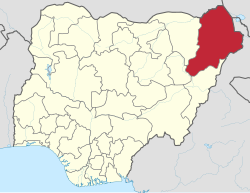The terrorist attack
The terrorists started from Boboshe, a well-known Boko Haram base, and crossed the defensive barrier around Maiduguri. They then started shooting in the north-eastern Nigerian city. One of the rockets hit a playground. The shots were heard as people ran for safety. The initial, seemingly aimless shooting was followed by an attack on the University of Maiduguri, where the terrorists' gunfire had already been targeted. [1]
During the incident, several high-profile structures in the city were damaged, including a mosque as well as Maiduguri International airport. [3]
The airport attack in particular gathered concern, given that it could begin a new trend for Boko Haram to target commercial airplanes. [4]
This page is based on this
Wikipedia article Text is available under the
CC BY-SA 4.0 license; additional terms may apply.
Images, videos and audio are available under their respective licenses.
